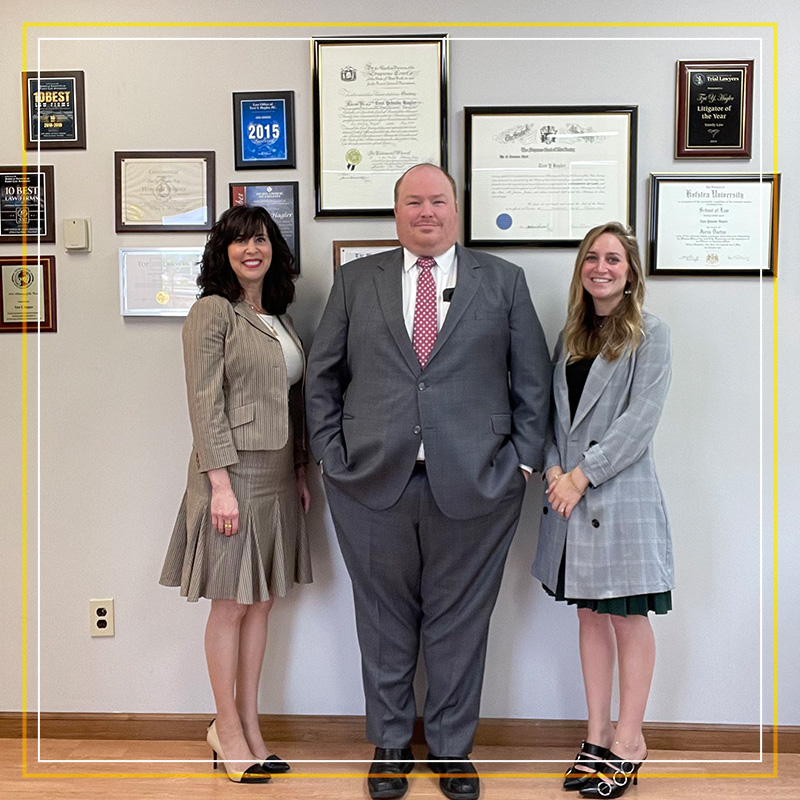There is a litany of case law detailing the numerous factors to be considered by the court in a relocation petition. These factors include, but are not limited to, the best interests of the child, the reasons for relocating, and the ability to maintain and foster a relationship between the child and non-custodial parent.

Frequently Asked Questions
Answers from Our Nassau County Divorce Attorneys. Serving Clients Throughout New York.
Legal matters involving your family can be complex and confusing. Below you will find some frequently asked questions regarding Divorce and Family Law, along with a brief answer to each question.
For more information and a detailed explanation tailored to your unique situation, please contact the Law Office of Tzvi Y. Hagler, P.C. by calling (516) 514-3868.

Our FAQ
Have questions? We are here to help. Still have questions or can't find the answer you need? Give us a call at 516-514-3868 today!
-
An uncontested divorce in New York is a type of divorce where both parties agree on all major issues, such as property division, child custody, and support payments. This can be beneficial as it often avoids the need for a lengthy courtroom battle, reduces stress, and can be more cost-effective. Our Nassau County family law attorneys are experienced in guiding clients through the uncontested divorce process, ensuring a peaceful resolution that respects the rights and interests of both parties.
-
A prenuptial agreement in Nassau County offers the benefit of protecting your financial well-being by detailing how property, assets, and debts will be managed in the event of a divorce. It must be signed by both parties without duress before marriage to be valid. Such agreements can provide peace of mind and clarity, helping to prevent future disputes and ensuring that both parties' interests are respected.
-
In New York, child custody and child visitation are distinct legal concepts that play critical roles in divorce proceedings. Custody can be categorized into legal and physical custody. Legal custody pertains to the right to make decisions about the child's upbringing, including education, religious practices, and medical care. Physical custody, on the other hand, determines where the child lives on a day-to-day basis. Sole or joint custody arrangements can be established depending on what's in the best interests of the child.
Visitation, alternatively, pertains to the court-ordered schedule that a non-custodial parent is allowed to spend time with their child. This schedule is set in a way that maintains a nurturing relationship with both parents, provided it's in the child's best interest. At Law Office of Tzvi Y. Hagler, P.C., we advocate for arrangements that not only reflect the parents’ rights but also prioritize the well-being of the child, negotiating terms that foster a conducive environment for the child's growth and development.
-
Yes, financial agreements, such as spousal support and child support, can be modified after a divorce is finalized if there has been a significant change in circumstances. These changes could include a substantial increase or decrease in either party's income, changes in employment status, or unexpected medical expenses. The court will assess whether the change is significant enough to warrant a modification and if the proposed change aligns with maintaining the best interests of any children involved.
It's important to work with a knowledgeable attorney to file a petition for modification correctly. At Law Office of Tzvi Y. Hagler, P.C., we guide our clients through this complex legal landscape, ensuring all petitions are thorough and supported by concrete evidence. We aim to secure modifications that are fair and reflective of the current needs and realities faced by our clients, helping them adjust to their new circumstances smoothly.
-
In Nassau County, grandparents can seek visitation rights through the family courts under specific circumstances. The court considers the prior relationship between the grandparent and the grandchild and the reasons for the application. Demonstrating a substantial existing relationship or proving that visitation serves the child’s best interests can lead to favorable outcomes. It's crucial for grandparents to clearly present evidence of the emotional and developmental benefits their involvement offers.
Our firm supports grandparents in navigating these situations by presenting compelling arguments and evidence that underscore the positive role they play in their grandchild’s life. We understand the emotional nuances of these proceedings and approach each case with diligence and empathy to secure a resolution that maintains family bonds. By advocating for grandparents' rights, we aim to reinforce the integral family connections that contribute to the well-being of children.
-
In Nassau County, there are several strategies to protect your assets during a divorce proceeding. An essential first step is to inventory all assets and liabilities, providing a clear view of what could be subject to division. Prenuptial and postnuptial agreements also serve as powerful tools for pre-emptively safeguarding wealth. These agreements clearly outline asset distribution and can minimize disputes in the event of a divorce.
If such agreements haven’t been executed, legal professionals can assist in freezing accounts, managing assets intelligently, or restructuring ownership of properties to protect your interests during the divorce process. Engaging with a family law attorney who understands the local landscape and legal nuances can empower individuals to preserve their financial integrity while transitioning through divorce proceedings. At Law Office of Tzvi Y. Hagler, P.C., we provide strategic counsel tailored to safeguarding your financial legacy.
-
No, however, the residency requirements must be satisfied.
In New York State, there are five ways to satisfy the requirements, which are, in no particular order:
- The parties were married in New York and at least one spouse still resides in New York and has for the previous one year.
- The parties lived as a married couple in New York and at least one spouse still resides in NY and has for the previous one year.
- The cause occurred in New York and at least one spouse still resides in New York and has for the previous one year.
- The cause occurred in New York, and both parties currently reside in New York.
- Either party has resided in New York for the past two years.
Is a cause or basis for a divorce required in New York?
Yes. New York has multiple grounds, however, at least one must exist for parties to be divorced in this state.
These grounds include, in no particular order:
- Cruel and inhuman treatment
- Abandonment of one year
- Constructive abandonment of one year
- Imprisonment
- Adultery
- Parties have lived separate and apart, pursuant to a separation agreement, for one year
- Irretrievable breakdown of the marriage for a period of six months
-
No, not officially. The recent law change added the grounds for divorce of irretrievable breakdown of the marriage for a period of six months, which is New York’s version of no-fault.
-
Yes. Your spouse’s lack of consent has no effect on your ability to obtain a divorce. Once you commence an action, your spouse needs to be personally served with a summons through a Notice of Summons with Complaint. Once served, he or she will only have a certain number of days to respond, or they will be in default.
-
There are numerous factors considered by either the Supreme Court (when in conjunction with a divorce) or the Family Court prior to awarding custody to a parent. However, the overriding factor is the best interests of the child.
-
Joint custody is a form of custody which consists of the two parents jointly consulting, discussing, and reaching all major decisions as they pertain to their child(ren). These major decisions typically refer to health, religion, and education, and can be extended, depending on the case.
-
Yes, there are very limited circumstances where the court will sanction no visitation. However, when necessary, the court will mandate supervised visitation either at a facility and/or by a neutral supervisor.
-
Yes, but only in the event of a change of circumstances sufficient enough to warrant a modification.
-
Yes. In New York, each parent has an obligation to support his/her child(ren). The court will require each parent to pay his/her pro-rata share of the total child support.
-
New York has a statutory formula to calculate basic child support, which is applied to the first $148,000.00 of combined parental income. The court can, but is not required to, apply the formula to income above $148,000.00.
The formula is as follows:
- For one child, the support is 17% of the adjusted gross income.
- For two children, the support is 25% of the adjusted gross income.
- For three children, the support is 29% of the adjusted gross income.
- For four children, the support is 31% of the adjusted gross income.
- For five or more children, the support is 35% of the adjusted gross income.
-
Yes, you may need to contribute to the child support add-ons, which generally include health insurance and child care. Other items that could be included are tuition, summer camp, and extracurricular activities.
-
The court is not required to use the reported income. The court is authorized to impute or attribute additional income to either parent when the court deems it necessary, based upon lifestyle, expenses, and other factors.
-
In NY, child support continues until emancipation, which is defined by either the child’s 21st birthday, the child obtaining full-time employment and/or financial independence, the child’s enrollment in the armed forces, the death of the child, or marriage of the child, whichever comes first.
-
It depends on whether you were at fault for the job change. If not, the court can modify your support obligation based on the change in circumstances.
-
No, a petition for modification/termination of child support must be brought to the court. It is essential to bring this petition as soon as possible, as the court can only provide retroactive relief to the date of filing, not the date of the change.
-
Full Question:
My spouse was the money earner and breadwinner of the family, while I was primarily responsible for raising the children and the upkeep of the house. Will I be entitled to receive support from my spouse after the divorce?
Generally, yes. In New York, spousal support, or maintenance, can be ordered to be given after the divorce. The courts are provided with numerous factors to consider in establishing a maintenance award. The amount and duration will vary based on the facts and circumstances of your case.
Some of these important factors include, but are not limited to:
- Income capability of each party
- Age and health of the parties
- Duration of the marriage
Maintenance is gender neutral and is primarily awarded when a large discrepancy exists between the income of the two parties, primarily when one spouse sacrificed his/her own career for the sake of the other spouse.
-
Full Question:
I am afraid that once I commence an action for divorce, my spouse will stop providing for me and my children. What steps can be taken to ensure this does not occur?
This is a common problem, and thankfully, New York has a type of relief called “pendente lite relief.” This is provided during the pendency of the action to allow the non-monied spouse to continue living during the action in accordance with the lifestyle they are accustomed to.
-
Pendente lite awards can include custody, child support, maintenance, exclusive occupancy of a marital residence, counsel fees, and other forms of bill payment to ensure the marital bills are paid during the action.
-
Full Question:
My spouse earns the money and can pay for his/her attorney; however, without his assistance, I cannot afford an attorney. Will the court order my spouse to pay my attorney?
One type of pendente lite relief is for counsel fees, and the court may direct the monied spouse to pay the other spouse’s attorney. This relief is commonly awarded to “level the playing field” and not let the monied spouse bully and force the other spouse into a bad settlement. -
You should immediately file an application in court to modify your child support obligation based on the change in circumstances you suffered. It is essential that the change in circumstances, i.e., your loss of employment, not be voluntary or due to your actions. Furthermore, you need to demonstrate an attempt to procure new employment comparable to your previous employment.
-
Full Question: The child support I receive is no longer sufficient to cover the basic expenses of my growing child(ren). Can I request additional support?
Yes. You need to file an application in court to modify the child support obligation based on the increase in expenses for your child(ren).
-
Yes. Under laws added in 2010, you may be entitled to an increase in child support if three years have passed since the current child support order or the income of the non-custodial parent has increased by 15%.
-
Yes. You should file for a modification of the custody and visitation order.
-
Full Question:
If my child(ren) leaves the custodian parent and moves in with me, must I continue to pay child support? Can I receive child support?
Because of the change in circumstances, you should be entitled to a modification of the child support order and be awarded child support based on the income of the other parent.
-
Full Question: Despite our court order, my child(ren)’s custodial parent refuses to allow me to exercise my visitation. Are they allowed to arbitrarily decide when I can and cannot visit my children?
No, and you should immediately bring an application to the court to enforce your visitation schedule and rights. Furthermore, you may be entitled to a modification of custody and/or an increase in visitation because of this behavior.
-
Yes. You need to file as soon as possible. The court can award you the modification retroactively, but only retroactive to the date of filing not the date the change in circumstances occurred.
-
Permission must be granted to allow a custodial parent to relocate with the children. The distance of relocation depends on your judgment of divorce or custody order. You need to obtain either written signed consent from the other parent, or permission by the court.
-
















